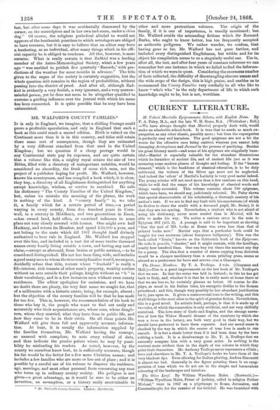CURRENT LITERATURE.
H. Valerii Martialis Epigrainmata Selecta, with English Notes. By F. A. Paley, M.A., and the late W. H. Stone, B.A. (Whittaker ; Boll.) —We have always thought that Martial, properly dealt with, would make an admirable school-book. It is true that he needs as mach ex- purgation as any other classic, possibly more ; but then the expurgation is perfectly easy and harmless. The good epigrams are not a bit the worse for the offensive ones being omitted. whereas you cannot help damaging Aristophanes and Juvenal in the process of purifying. Besides his great literary merit—and some of his epigrams are singularly beau- tiful—Martial is especially valuable for the abundant illustrations which he tarnishes of ancient life, and of ancient life just as it was assuming some modern phases of thought and feeling. If the "human element," which is the backbone of classical education, is to be duly cultivated, the writers of the Silver age must not be neglected. And indeed the 'silver' of Martial's Latinity is very good metal indeed. The young scholar will not need more than a few cautions on this head, while he will find tho range of his knowledge of classical words and things vastly extended. This volume contains about 700 epigrams, which have been, we should say, judiciously selected. Mr. Paley shows that special characteristic of his scholarship, a thorough mastery of his author's text. If we are to find any fault with his annotations (of which ho desires to share the credit with a deceased pupil, Mr. Stone), it is that they are too sparing. Nevertheless, a student who is not afraid of using his dictionary, never more needed than in Martial, will be able to make his way. We notice a curious error in the note to Epigram 692 (xiii. 3). A passage is said to be important as showing that the cost of MS. books at Rome was even less than that of printed books now." Martial says that a particular book could be bought for two sestercos (about fourpence halfpenny). This was the book called "Xenia," known as the thirteenth book of the Epigrams. He calls it gracilis, "slender," and it might contain, with the headings, nearly four hundred lines. One can buy ten times the amount any day for a penny. The idea that a number of slaves copying from dictation would be a cheaper machinery than a steam printing press, seems as absurd as a preference for bows and arrows over a Chassepot.


































 Previous page
Previous page